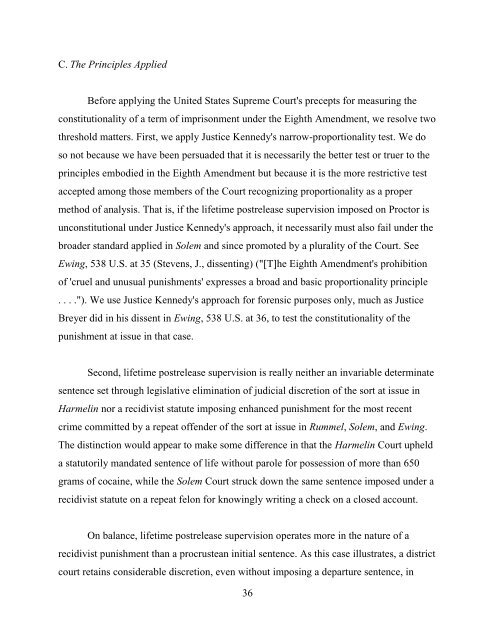State v. Proctor - Kansas Judicial Branch
State v. Proctor - Kansas Judicial Branch
State v. Proctor - Kansas Judicial Branch
You also want an ePaper? Increase the reach of your titles
YUMPU automatically turns print PDFs into web optimized ePapers that Google loves.
C. The Principles Applied<br />
Before applying the United <strong>State</strong>s Supreme Court's precepts for measuring the<br />
constitutionality of a term of imprisonment under the Eighth Amendment, we resolve two<br />
threshold matters. First, we apply Justice Kennedy's narrow-proportionality test. We do<br />
so not because we have been persuaded that it is necessarily the better test or truer to the<br />
principles embodied in the Eighth Amendment but because it is the more restrictive test<br />
accepted among those members of the Court recognizing proportionality as a proper<br />
method of analysis. That is, if the lifetime postrelease supervision imposed on <strong>Proctor</strong> is<br />
unconstitutional under Justice Kennedy's approach, it necessarily must also fail under the<br />
broader standard applied in Solem and since promoted by a plurality of the Court. See<br />
Ewing, 538 U.S. at 35 (Stevens, J., dissenting) ("[T]he Eighth Amendment's prohibition<br />
of 'cruel and unusual punishments' expresses a broad and basic proportionality principle<br />
. . . ."). We use Justice Kennedy's approach for forensic purposes only, much as Justice<br />
Breyer did in his dissent in Ewing, 538 U.S. at 36, to test the constitutionality of the<br />
punishment at issue in that case.<br />
Second, lifetime postrelease supervision is really neither an invariable determinate<br />
sentence set through legislative elimination of judicial discretion of the sort at issue in<br />
Harmelin nor a recidivist statute imposing enhanced punishment for the most recent<br />
crime committed by a repeat offender of the sort at issue in Rummel, Solem, and Ewing.<br />
The distinction would appear to make some difference in that the Harmelin Court upheld<br />
a statutorily mandated sentence of life without parole for possession of more than 650<br />
grams of cocaine, while the Solem Court struck down the same sentence imposed under a<br />
recidivist statute on a repeat felon for knowingly writing a check on a closed account.<br />
On balance, lifetime postrelease supervision operates more in the nature of a<br />
recidivist punishment than a procrustean initial sentence. As this case illustrates, a district<br />
court retains considerable discretion, even without imposing a departure sentence, in<br />
36

















